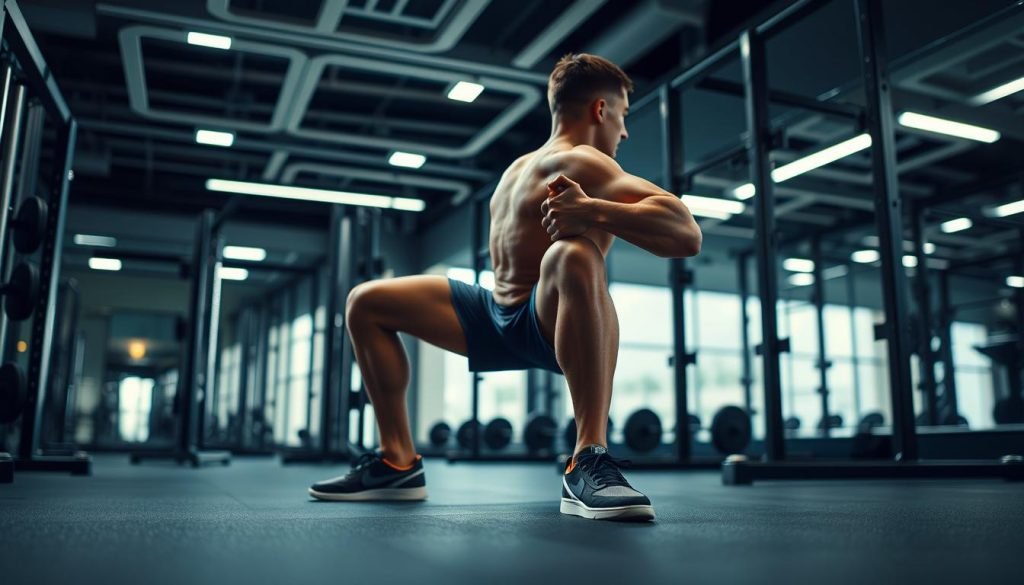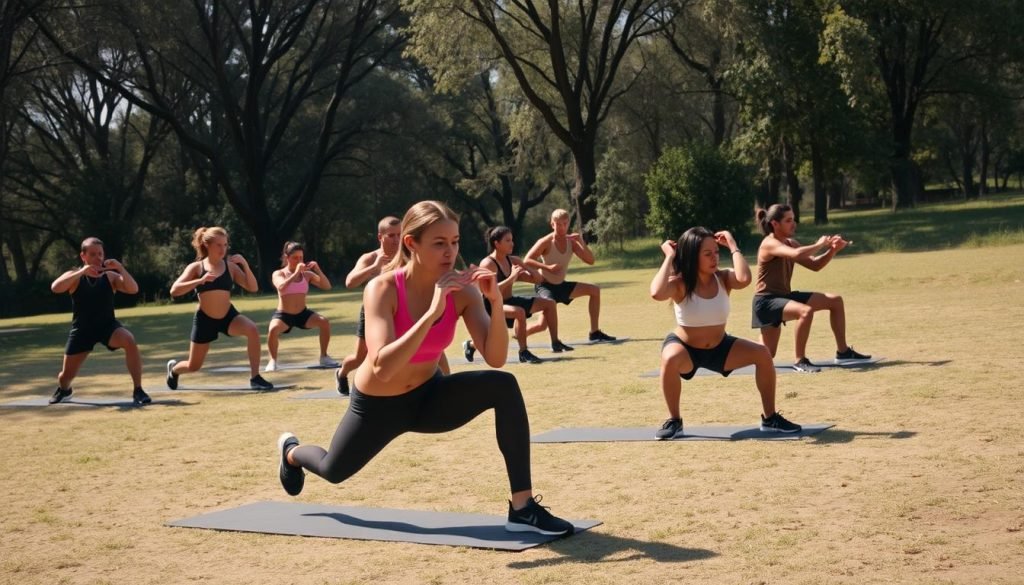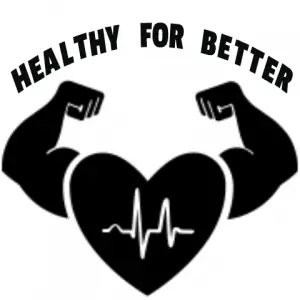Ever thought you could sculpt your legs without a leg press machine? The answer might surprise you. This guide will show you effective leg press alternatives you can do at home. You'll need minimal equipment or just your body weight.
Leg press exercises are key for building strong legs. They work on many muscles, like quads, glutes, and hamstrings. But what if you can't get to a gym or have a leg press machine? Worry not – there are many home exercises and bodyweight alternatives that work just as well.
Research shows that leg press exercises boost muscle strength and bone health, especially in older folks. A 2000 study by Rhodes et al. found that resistance training, like leg press, improves bone density in elderly women.
If you want to get stronger, prevent injuries, or fight muscle loss with age, this guide has you covered. We'll explore resistance band exercises, squats, lunges, and broad jumps. You'll learn how to strengthen your legs effectively at home.
Key Takeaways
- Leg press alternatives can target the same muscle groups as machine exercises
- Resistance bands offer a portable and convenient substitute for leg press machines
- Bodyweight exercises like squats and lunges provide similar benefits to leg presses
- Home workouts can effectively build leg strength without expensive equipment
- Proper form and technique are crucial for maximizing results and preventing injuries
Understanding the Benefits of Leg Press Movements
Leg press movements are a great way to strengthen your legs and boost fitness. They work on key muscles, helping you build muscle and get better at everyday activities. Adding leg press alternatives to your workout routine can bring many benefits.
Building Lower Body Strength
Leg press exercises are perfect for strengthening your lower body. They focus on the quadriceps, hamstrings, and glutes. These muscles are vital for daily tasks. By using leg press alternatives, you can get similar results without a machine.
Muscle Development and Growth
Leg press movements help grow muscles in your lower body. They fight against muscle loss as you age and lower injury risks. Changing your foot position during these exercises targets different muscles, fixing imbalances.
Functional Fitness Benefits
Leg press exercises improve your ability to do daily tasks. They boost balance, stability, and leg strength. This is key for climbing stairs or carrying groceries.
| Exercise | Primary Muscles Worked | Additional Benefits |
|---|---|---|
| Leg Press | Quadriceps, Hamstrings, Glutes | Controlled movement, Less core engagement |
| Squats | Quadriceps, Hamstrings, Glutes | Core engagement, Improved flexibility |
| Lunges | Quadriceps, Hamstrings, Glutes | Balance improvement, Unilateral strength |
Knowing these benefits helps you choose the right exercises for your fitness goals. Leg press movements or their alternatives can enhance leg strength and muscle building.
Essential Equipment for Home Leg Press Alternatives
Setting up a home gym doesn't need to be expensive. You can get leg press-like results in your living room with the right gear. Let's look at what you'll need to start.
Resistance Bands and Their Uses
Resistance bands are a big help for home workouts. They offer the same resistance as a leg press machine. They come in different strengths, so you can keep getting stronger.
Use them for leg presses by attaching them to something sturdy. Then, push against the tension.
Basic Home Equipment Needs
There are a few key items you'll need for your leg workouts:
- An exercise mat for comfort and stability
- A stable chair for support during exercises
- An exercise ball for balance and core engagement
- Dumbbells or kettlebells for extra resistance
Creating a Workout Space
You don't need a lot of space for a workout area. Just find a spot where you can move around easily. Make sure it's well-ventilated and has a non-slip floor.
Keep your gear organized and within reach. Having a dedicated space helps you stay on track with your workouts.
“The best workout space is one that motivates you to use it regularly. Make it inviting and functional.”
With the right equipment, you can do a great leg workout at home. No need for a leg press machine!
Leg Press Without Machine: Core Techniques
Learning the right way to do leg press without a machine is key for safety and results. This part will teach you the best ways to exercise.
Proper Form and Positioning
When doing leg press alternatives, keep your back straight and core tight. For wall sits or resistance band presses, place your feet shoulder-width apart. Make sure your knees are in line with your toes.

Range of Motion Guidelines
For the best results, aim for a full range of motion in your leg press substitutes. In squats or lunges, lower until your thighs are parallel to the ground. For band exercises, push your feet away until your legs are almost straight, then go back to the start.
Safety Considerations
Always warm up and start with light weights for safety. Don't lock your knees at the top to avoid injury. If you feel pain, stop right away and talk to a fitness expert.
- Start with bodyweight exercises to perfect your form
- Gradually increase resistance as you build strength
- Use a spotter when attempting heavy lifts
By using these core techniques, you can safely do leg press at home or in any gym. Remember, the right exercise technique is crucial for reaching your fitness goals and staying safe.
Resistance Band Leg Press Variations
Resistance band exercises are great for home workouts. They work the same muscles as leg presses but don't need gym equipment.
There are two main ways to do leg press with resistance bands. The lying version has you loop the band around your feet. Hold the ends and press your feet against the band. The seated version is done sitting in a chair, wrapping the band around your feet, and pushing against it.
To make it harder, use shorter or thicker bands. This lets you challenge your muscles more, just like adding weights. These exercises target your quadriceps, hamstrings, glutes, and calves, just like a traditional leg press.
- Lying resistance band leg press
- Seated resistance band leg press
- Standing resistance band leg press
Resistance band leg press exercises have many benefits. They're gentle on your knees and back, making them good for people with injuries. They also help improve balance and strength. Plus, they're perfect for all fitness levels, from beginners to advanced athletes.
Bodyweight Exercises for Leg Press Simulation
Bodyweight leg exercises are a great way to build strength without needing gym equipment. They include squat variations and plyometric exercises. These can effectively target key muscle groups in your lower body, just like a leg press.
Wall Sits and Modifications
Wall sits are a simple yet effective exercise for building leg strength. To perform:
- Lean against a wall, sliding down until your thighs are parallel to the ground
- Keep your back flat against the wall
- Hold this position for 30-60 seconds
For an added challenge, try single-leg wall sits or add small pulses.
Bulgarian Split Squats
Bulgarian split squats are a powerful unilateral exercise. They work your quadriceps, glutes, and hamstrings while improving balance. To execute:
- Stand about 2 feet in front of a bench
- Place one foot behind you on the bench
- Lower your body until your front thigh is parallel to the ground
- Push back up to the starting position
Jump Training Variations
Plyometric exercises like jump squats can boost leg power and explosiveness. Here's how to do jump squats:
- Start in a squat position
- Explode upward, jumping as high as you can
- Land softly, immediately lowering into the next squat

| Exercise | Primary Muscles Worked | Difficulty Level |
|---|---|---|
| Wall Sits | Quadriceps, Glutes | Beginner |
| Bulgarian Split Squats | Quadriceps, Glutes, Hamstrings | Intermediate |
| Jump Squats | Quadriceps, Glutes, Calves | Advanced |
Incorporating these bodyweight exercises into your routine can provide a challenging leg workout without the need for a leg press machine. Remember to focus on proper form and gradually increase intensity for optimal results.
Progressive Overload Strategies
Progressive overload is crucial for getting stronger and building muscle. It means slowly making your workouts harder to keep pushing your limits. When looking for leg press alternatives, you can use this method in different ways.
One good strategy is to tighten the resistance bands. Start with lighter ones and switch to heavier ones as you get stronger. This way, you keep making your workouts more challenging, which is great for muscle growth.
Another method is to add weights to bodyweight exercises. For example, hold dumbbells while doing squats or wear a weighted vest for wall sits. This increases the load on your muscles, helping them grow stronger.
- Increase reps: Start with 8-10 reps and gradually work up to 12-15
- Adjust tempo: Slow down the eccentric phase of the movement
- Reduce rest periods: Gradually decrease rest time between sets
Consistency and gradual increases are key to getting stronger. Don't rush it. Pay attention to your body and adjust your workout intensity to avoid injury and keep growing muscle.
“The secret to getting ahead is getting started. The secret to getting started is breaking your complex overwhelming tasks into small manageable tasks, and then starting on the first one.” – Mark Twain
Building an Effective Workout Routine
Creating a solid leg workout routine is key to achieving your fitness goals. Exercise programming plays a crucial role in maximizing results and preventing plateaus. Let's explore how to structure your workouts for optimal gains.
Sets and Repetitions Guide
For leg exercises, aim for 3-4 sets of 8-12 repetitions. This range targets muscle growth and strength. Adjust the weight to challenge yourself while maintaining proper form.
| Exercise | Sets | Reps |
|---|---|---|
| Resistance Band Leg Press | 3 | 10-12 |
| Wall Sits | 3 | 30-60 seconds |
| Bulgarian Split Squats | 3 | 8-10 per leg |
| Jump Squats | 3 | 8-10 |
Rest and Recovery Periods
Rest between sets is vital for performance and muscle recovery. Take 60-90 seconds between sets. Incorporate recovery strategies like stretching and foam rolling post-workout to reduce soreness and improve flexibility.
Weekly Program Structure
Design your leg workout routine to include 2-3 sessions per week. Space these workouts evenly to allow for adequate recovery. Mix resistance band exercises with bodyweight movements for a balanced approach to leg training.
- Monday: Lower body focus
- Wednesday: Upper body or cardio
- Friday: Lower body focus
Remember, consistency is key in any exercise programming. Stick to your routine and progressively increase intensity for continued improvements in leg strength and muscle development.
Common Mistakes and How to Avoid Them
Doing leg press exercises without a machine can be challenging. Many people make mistakes that hurt their form and increase injury risk. Let's look at these common errors and how to avoid them.
One common mistake is using too much weight. This can lead to bad form and injury. Start with a weight you can manage, focusing on good technique first. Remember, it's better to do it right than to do too much.
Another mistake is not using the full range of motion. Doing partial reps doesn't give you the full benefit. Make sure to fully extend and contract your leg muscles in each rep. This helps engage your muscles better and gets you more out of the exercise.
- Incorrect foot placement
- Allowing knees to cave inward
- Failing to engage the core
- Jerking movements instead of controlled motions
To avoid these mistakes, keep your form right. Place your feet shoulder-width apart, toes pointing slightly outward. Push through your heels and keep your knees in line with your toes. Also, engage your core and move slowly and controlledly for the best results and to prevent injuries.
By being aware of these common mistakes and focusing on proper form, you'll get the most out of your leg press alternatives. This way, you'll also lower your risk of injury. Remember, being consistent and doing it right is key to reaching your fitness goals safely and effectively.
Conclusion
Leg press benefits go beyond the gym, helping boost leg strength and fitness. Machines offer stability, but home workouts are just as effective. Alternatives to traditional leg presses can also lead to great results.
Resistance bands, bodyweight exercises, and plyometrics are great substitutes for machines. They build muscle and improve balance and coordination. By focusing on form and increasing intensity, you can see big gains in leg strength and muscle from home.
Consistency is crucial. Aim for 2-3 leg workouts a week, adjusting sets and reps as needed. Whether you're focusing on endurance or strength, the right approach can lead to amazing progress. Try these leg press alternatives to boost your fitness and enjoy the benefits of a strong lower body.
FAQ
Can I really build leg strength without a leg press machine?
Absolutely! You can build leg strength with alternatives like resistance bands, squats, lunges, and broad jumps. These exercises work the same muscles as a leg press machine, like quads, glutes, and hamstrings.
What equipment do I need for home leg press alternatives?
You'll need resistance bands for home leg press alternatives. A mat, chair, or exercise ball might also be helpful. Resistance bands are great because they're portable and compact.
How do I perform a resistance band leg press?
Lie on a mat face up and lift your feet off the mat. Bend your knees to 90 degrees. Press your feet against the bands, keeping tension. Be explosive on the press and slow on the return.
What are some bodyweight exercises that simulate a leg press?
Try wall sits, Bulgarian split squats, and jump training like broad jumps. These exercises target similar muscles as the leg press, helping build leg strength.
How can I progress in my leg workouts without a machine?
Increase resistance band tension or add weights to bodyweight exercises. Use explosive movements and slow returns for resistance band exercises. For squats, add dumbbells or kettlebells to make it harder.
How often should I do leg exercises at home?
Aim for 2-3 leg exercises at home per week. Start with 1-3 sets of 8-12 reps for each exercise. Rest well between sets and workouts for muscle recovery and growth.
What are common mistakes to avoid when doing leg press alternatives?
Avoid improper form, too little resistance, and not using full range of motion. Focus on proper positioning, increase resistance as you get stronger, and ensure full extension and contraction.
Are home leg exercises as effective as using a leg press machine?
Yes, home leg exercises can be as effective as a leg press machine if done right. By using a variety of exercises and following proper form, you can build strong legs at home.
How do I know if I'm using the correct form for leg exercises?
Use correct positioning, engage your core, and follow the right range of motion. Start with bodyweight exercises to get the form right before adding resistance. Use a mirror or record yourself to check your form.
Can I do isometric leg exercises at home?
Yes, isometric leg exercises are great for home workouts. Wall sits are a good example. Hold the position for 30-60 seconds, increasing the time as you get stronger.
Source Links
- https://www.healthline.com/health/leg-press-alternative
- https://www.garagegymreviews.com/how-to-do-a-leg-press-at-home
- https://www.healthline.com/health/exercise-fitness/leg-press-vs-squat
- https://www.verywellfit.com/how-to-do-the-leg-press-3498610
- https://www.kaylaitsines.com/blogs/exercises/leg-press-alternatives
- https://homegymsupply.co.uk/blogs/guides/leg-press-alternatives?srsltid=AfmBOorydSZsIdJMwyZIXCni_-U95kmjJZSKrRU_BabLaR1u7R4KDwtI
- https://www.livestrong.com/article/13777555-leg-press-alternatives/
- https://selectfitnessusa.com/blogs/leg-press-machines/leg-press-machine-alternatives?srsltid=AfmBOorif0j1c8Wc6plh3Jz5um40-HP2-kI6mMAF58ba4AAX8YsvyeoH
- https://stronghomegym.com/leg-press-alternative/
- https://homegymsupply.co.uk/blogs/guides/leg-press-alternatives?srsltid=AfmBOoqFPvHoiPb-0IAplIzHJZrFN0nyIG_93ZB-fGBPc8Ip4PXtkm7v
- https://www.hevyapp.com/leg-press-alternative/
- https://strengthwarehouseusa.com/blogs/resources/leg-press-alternatives?srsltid=AfmBOoq90bGkKoUDbTcf6Lp6dU-jtaHMecYnCCTPfBUdCmohh00gQOIq
- https://www.menshealth.com/uk/building-muscle/a756325/10-best-bodyweight-exercises-for-men/
- https://expressblog.co.uk/leg-press-substitute/
- https://builtwithscience.com/fitness-tips/progressive-overload-techniques/
- https://strengthwarehouseusa.com/blogs/resources/leg-press-alternatives?srsltid=AfmBOooFCxVSJsJH63F9di2wKlI6NuXrGamETQpXWV1U8kYCsWhy5yHK
- https://barbend.com/progressive-overload/
- https://strengthwarehouseusa.com/blogs/resources/leg-press-alternatives?srsltid=AfmBOorc-krNOHvGqF63zRgg6_FzhChi8hSnf4j2V8YxfRxSTF0v5gSs
- https://homegymsupply.co.uk/blogs/guides/leg-press-alternatives?srsltid=AfmBOoont1DsEYt77IXyZuywK9frSiWXEYDa4tYbDz_uClJe_CwEWljJ
- https://www.boostcamp.app/blogs/leg-press-alternative-at-home-or-at-gym
- https://www.issaonline.com/blog/post/leg-press-exercise-guide-plus-common-mistakes
- https://www.dmoose.com/blogs/training/6-worst-leg-press-mistakes-how-fix-them?srsltid=AfmBOorwiawkThYptC90CT-2WnM6KzxhEDCnb6tyPVrshHMSHhVVNUx2
- https://gmwdfitness.com/blogs/news/how-to-do-the-leg-press-proper-form-variations-and-mistakes-to-avoid?srsltid=AfmBOoqpiYWzywAglQ7eRBk56ByiSidask41cmOwM_x2Mnb6Mqd1WcFw
- https://selectfitnessusa.com/blogs/leg-press-machines/leg-press-machine-alternatives?srsltid=AfmBOoraPQAkMiIix2kbwkn0AN4bhm-jC8grDMCGlYd00nGiPpwEhsxU
- https://strengthwarehouseusa.com/blogs/resources/leg-press-alternatives?srsltid=AfmBOorMbAcFKOdKyNgXqA6GPWJ9Mp4Aq_Xm1axQDIhJKA8qaj7P44uZ
- https://mrahwithabee.com/leg-press-alternative-for-effective-leg-workouts/
Recent Posts
It's important to evaluate whether Beachbody On Demand continues to meet your fitness needs as we enter 2025. With a range of workout programs and nutrition plans, the platform claims to cater to...
Just like having a personal trainer at your fingertips, Beachbody On Demand offers you an extensive library of on-demand workout programs accessible anytime, anywhere. This service allows you to...

